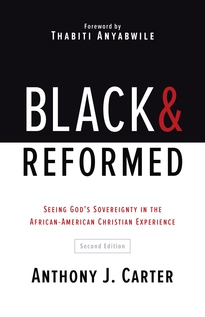 A common push-back against the doctrine of God’s sovereignty (Calvinism/reformed soteriology) is: “What about a good person who doesn’t believe in Jesus? Did God want that person to go to hell?”
A common push-back against the doctrine of God’s sovereignty (Calvinism/reformed soteriology) is: “What about a good person who doesn’t believe in Jesus? Did God want that person to go to hell?”
That is perhaps the most frequent objection that I’ve run into when talking about these doctrines with other Christians. But for many African-Americans that is not the most common question. The most common objection might be more along the lines of: “How can God be sovereign over a nation that practiced slavery, especially when many of the slave owners and traders claimed the name of Christ?”
In other words, if you think you have a hard time answering an objection about God’s sovereignty over the death of someone’s great-grandmother, try answering that objection when it touches someone’s entire culture.
This is why there is a need for a book written particularly about the doctrines of God’s sovereignty and how African-Americans should understand them. I’m grateful to Anthony Carter for writing Black and Reformed, because it is that book.
It should be noted that Black and Reformed does more than simply explain how God can be sovereign over an institution as evil as slavery. Carter patiently and succinctly describes the five-points of Calvinism, then distills reformed theology down to three points (God is king, we are sinful, and this points to the need for Christ). He ends with an appeal for his readers to believe reformed theology because it does 2 things: it best fits with Scripture and it best explains the African-American experience.
Carter makes it clear that when he is describing reformed theology he is not advocating for confessional theology, any kind of millennial view, or infant baptism—in fact, I believe Carter himself is baptistic, judging by his church’s website. When he uses the term reformed theology he simply means the five points of Calvinism, plus an understanding of God’s sovereignty that is all-encompassing.
Black and Reformed only spends a few pages directly on the five points, but spends much more time dealing with God’s sovereignty beyond just salvation. This approach makes sense because the objection he is arguing against is not necessarily an individual’s election, but a country’s past which is rooted in evil. Carter doesn’t give God wiggle room, or try to diminish God’s sovereignty. Rather he proclaims that God “exercises kingly dominion” over all his creatures, and all his creatures are sinful.
The worse the sin, Carter says, the more evident our need for Christ. The worse the culture, the less education, ambition, sociological manipulation, or economic reforms can be seen as passible alternatives (“If you take a fool who is stealing railroad ties and educate him, he will come back and steal the whole track,” p. 55).
Instead, the doctrine of God’s rule over his sinful creation serves to direct us toward our need for Christ.
The last half of the book is spent on its main point: there are three reasons you should embrace reformed theology; it is biblical, it is historical, and it is experiential. All three of these should particularly have a home in an African-American culture.
The biblical argument is self-evident, but the other two were presented in a way I had never thought deeply about before. Understand that the existence today of any strong churches that are predominately African-American is in itself an argument for reformed theology. How else would you explain it? The African-American culture has grown out of a history that forbid slaves from reading, attempted to use Christianity to justify exploiting slaves, and ultimately resulted in several denominations forbidding the evangelism of blacks.
People were afraid that evangelism would lead to emancipation. People were afraid that if converted, slaves would not want to work on Sundays. And many simply believed that blacks were “too bestial” to be educated to begin with.
Despite this, God left a witness in the African-American church. Carter describes some black pastors (some of whom even pastored white congregations), and then he describes the denominational splits that came out of this. Yet 200 years later there is still a strong evangelical presence in the African-American community. The best (only?) explanation for this is the sovereignty of God. Carter writes,
“Why should African Americans embrace a Reformed theological understanding? Because like any segment of the church, African-American Christians should see their experience and existence as being ordained by God, according to his plan and for his glory” (p. 114).
The existence of black Christians in the Untied States today is public proof that “God literally raises his church up from chains” (p. 66).
Finally, Carter says that you should embrace reformed theology because it is uniquely “experiential.” In other words, the basis of salvation is regeneration, which happens to you, and then results in a changed life. Its not simply about an intellectual assent—something that seems to skate by so easily in many predominately white churches—but is rather a faith that requires you to live differently. This emphasis on action fits nicely in an African American culture.
“Reformed Theology sees all of life, every experience, as being in the sovereign plan and purpose of God, and thus for our good and his glory” (p. 116). I think that better responds to objections about God’s sovereignty than any other theological system.
I hope this book is widely read because it presents a convincing case for the doctrine of God’s sovereignty. Carter succeeds in taking an area that many don’t often connect to God’s sovereignty (slavery), and turns it into a compelling appeal for you see God at work in your own life.
